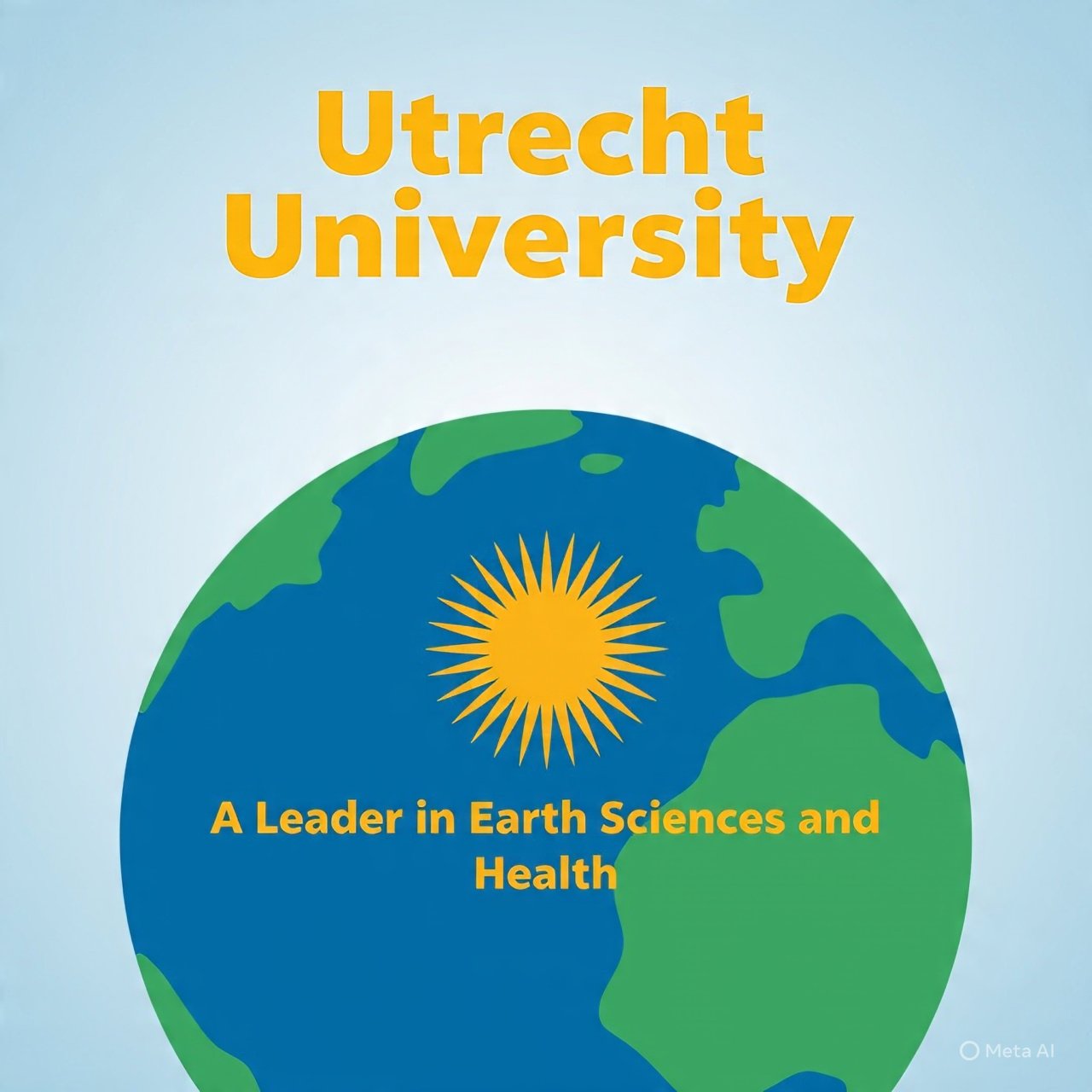🌍 Utrecht University: A Center of Knowledge and Humanity
The story of Utrecht University’s grandeur highlights the unique identity of this historic educational institution located in the heart of the Netherlands
Introduction: A Great Center for Knowledge and Service to Humanity
The story of Utrecht University’s grandeur highlights the unique identity of this historic educational institution located in the heart of the Netherlands, which was established in 1636 and today holds global leadership in Earth Sciences and Health fields. This is not merely an educational institution but a city of knowledge and research where a beautiful blend of old traditional architecture and modern scientific laboratories can be seen. Its research in Earth Sciences presents revolutionary discoveries in ocean sciences, climate change, earth evolution, and sustainable energy fields, while in the Health field, it is setting new standards in biomedical research, clinical sciences, and public health. The secret of this university’s success lies in its interdisciplinary approach, where Earth Sciences experts and Health researchers work together and benefit from each other’s experiences. This article will present a comprehensive review of various aspects of Utrecht University’s global leadership in both these fields, historical context, research achievements, and future vision.
Historical Heritage: A Four-Century Journey in the Light of Knowledge
The history of Utrecht University covers a journey that began in 1636 and left deep marks on European educational history. Its establishment occurred in the early years of the Enlightenment era, when knowledge and rationalism were gaining new importance. In the initial period, this university provided education in theology, law, medicine, and philosophy fields. During the Industrial Revolution of the 19th century, the university gave special importance to scientific research and established new departments in physics, chemistry, and biology fields. Earth Sciences field took formal shape in the early 20th century and the first complete Department of Earth Sciences was established in 1920. The development journey of Health field accelerated in the 1960s when the university medical center expanded and new research facilities were established. In the 1980s, the university adopted a policy to promote interdisciplinary research, under which cooperation between Earth Sciences and Health fields received new momentum. In 2010, the university placed “Sustainability and Health” at the center of its research agenda and increased investment in both these fields. Today, this university is serving humanity by weaving its four centuries of academic tradition with modern research.
Research Excellence in Earth Sciences: Unraveling Earth’s Mysteries
Utrecht University’s Earth Sciences department is famous worldwide for its research achievements, which include deep study of the interrelationships of Earth’s different systems and their evolution. This department’s research has four main focuses: climate change, earth evolution, ocean sciences, and environmental sustainability. University researchers have presented revolutionary discoveries regarding global warming, especially their research on the interrelationship between ice sheet melting and sea level rise has had deep impacts on global policy making. In earth evolution field, the university’s geologists have shed new light on earth’s crust movements, earthquake factors, and mineral resource evolution. In ocean sciences field, researchers have made important contributions in marine biology, ocean chemistry, and marine ecology fields. In environmental sustainability field, the university’s research focuses on renewable energy, sustainable development, and environmental protection topics. The university’s Earth Sciences department has played a key role in international research projects, including Antarctic Research Program, European Union environmental projects, and United Nations Sustainable Development Goals.
Revolutionary Discoveries in Health Sciences: New Horizons of Human Health
Utrecht University’s Health Sciences department is presenting revolutionary discoveries in biomedical research, clinical sciences, and public health fields. The university’s Utrecht University Medical Center (UMC Utrecht) is one of the most prominent medical institutions in the Netherlands, where thousands of patients receive state-of-the-art treatment every year. In biomedical research field, university researchers have achieved significant successes in cancer therapy, neurological disease treatment, and genetic therapy fields. In clinical sciences field, teams of doctors and researchers are working on new diagnostic techniques and treatment methods. In public health field, the university’s research focuses on epidemics, public health issues, and healthcare systems. The university’s Health Sciences department played an important role during the coronavirus pandemic, where researchers worked on vaccine development, epidemic spread modeling, and new patient treatment methods. A characteristic of the university’s health research is its interdisciplinary approach, where doctors, engineers, computer scientists, and social scientists work together.
Interdisciplinary Cooperation: Bridging Knowledge Boundaries
The important secret of Utrecht University’s success is its old tradition of promoting interdisciplinary cooperation, where experts from different fields together discover solutions to complex problems. Cooperation between Earth Sciences and Health fields has particularly produced notable results. For example, the university’s environmental experts and epidemiologists together studied how environmental changes affect human health. Similarly, the university’s geologists and biomedical researchers together researched what effects earth minerals have on human health. The university has established special programs and institutions to promote interdisciplinary research, including “Institute for Sustainable Development” and “Center for Health and Innovation.” Under these institutions, researchers from different fields work on joint projects and benefit from each other’s experiences. The success of the university’s interdisciplinary research can be gauged from the fact that its researchers’ joint research is published in reputable international journals and utilized globally.
Academic Programs: Comprehensive Curriculum for Guiding New Generation
Utrecht University’s academic programs in Earth Sciences and Health fields not only provide knowledge but also develop critical thinking, research skills, and sense of social responsibility in students. In Earth Sciences field, the university offers various programs at undergraduate, master’s, and doctorate levels, including geology, environmental science, ocean sciences, and climate change topics. In Health field, the university offers medicine, biomedical sciences, public health, and clinical research programs. The characteristic of these academic programs is their practical and research-oriented approach, where students have access to state-of-the-art laboratories and research facilities. The university’s “Problem Based Learning” methodology has significantly improved students’ academic performance. Interdisciplinary programs have given students the opportunity to be equipped with knowledge from different fields. The university’s teaching success can be gauged from the fact that its graduated students hold important positions in renowned research institutions, medical centers, and educational institutions worldwide.
Industrial and International Partnerships: Development Through Global Cooperation
Utrecht University has further strengthened its research capabilities in Earth Sciences and Health fields through industrial and international partnerships. Regarding industrial partnerships, the university has established cooperation with major companies in energy, pharmaceuticals, environmental technology, and healthcare sectors. Under these partnerships, joint research projects, industrial chairs, and incubation centers have been established. Regarding international partnerships, the university has developed deep relations with European Union research programs, United Nations environmental projects, and global health organizations. The university’s “Utrecht Sustainable Development Network” cooperates with universities and research institutions from 50+ countries. In Health field, the university’s “Global Health Initiative” is working to solve health problems in developing countries. These partnerships have not only enhanced the university’s research capabilities but have also created opportunities for its students and researchers to gain international experiences.
Research Infrastructure: Collection of State-of-the-Art Facilities
Utrecht University’s research infrastructure provides all necessary facilities for world-class research in Earth Sciences and Health fields. In Earth Sciences field, the university has state-of-the-art geological laboratories, including Magnetic Resonance equipment, spectrometers for analyzing earth samples, and supercomputers for climate modeling. The university’s “Urban Space Research Institute” observes Earth’s different systems through satellite data. In Health field, the university has state-of-the-art medical equipment, including MRI scanners, chromatography machines, and genetic analysis equipment. The university’s “Biomedical Research Center” is dedicated to state-of-the-art biological research. For maintenance of research infrastructure, the university has deployed 300+ technical staff. The university’s research equipment and facilities are also available to international researchers, which has promoted international research cooperation.
Sustainability Initiatives: Practical Model of Environmental Responsibility
Utrecht University has made several notable initiatives in sustainability sector, which are practical expressions of its Earth Sciences department’s research expertise. The university has set the target of becoming carbon neutral by 2030 and is working on renewable energy projects in this regard. Solar panels have been installed on the university campus, which meet part of the university’s energy needs. Under the university’s “Sustainable Mobility Plan,” use of electric vehicles and bicycles is being promoted on campus. Under the university’s “Waste Management System,” waste is recycled. The university has worked on the “Green Roofs” project, under which gardens have been planted on building roofs. Under the university’s “Biodiversity Protection Program,” local plants and animals have been preserved on campus. The university’s sustainability efforts have been recognized internationally and it has been awarded the “Green University Award.”
Students and Faculty: A Dynamic Academic Community
Utrecht University’s academic community consists of 30,000+ students and 7,000 faculty and staff, making it one of the largest universities in the Netherlands. In Earth Sciences and Health fields, 8,000+ students are studying and 1,500 faculty and researchers are working. Student life is comprehensive and balanced, where cultural and social programs are given importance along with academic activities. The university’s “Student Life Center” has 100+ student organizations working. The faculty community consists of international level experts, including Nobel Prize-winning scientists, international research award winners, and renowned academic personalities. The research of university faculty and researchers is published in reputable international journals and utilized globally. The deep relationship between students and faculty is an important secret of the university’s academic success.
Global Impact: International Rankings and Recognition
Utrecht University has established its identity globally in Earth Sciences and Health fields. Its position in global rankings is enviable – in QS World University Ranking 2023, it was ranked the 50th best university in the world, while in Earth Sciences field its number is 20 and in Health field 35. In Times Higher Education World University Ranking, it is at 65th position. Utrecht University’s strong points in these rankings include research quality, international cooperation, and educational impact. The university’s Earth Sciences department is recognized globally for environmental research, while its Health field biomedical research has received international honors. The university’s international recognition can be gauged from the fact that 20% of its students and 30% of its faculty are international.
Future Plans: Preparation for Solving New Challenges
Utrecht University’s future plans express preparation for solving new challenges in Earth Sciences and Health fields. The university has prepared a “Strategic Vision Plan” for 2030, which has three main axes: research excellence, interdisciplinary cooperation, and social impact. Under the research axis, the university has set the target of establishing new research laboratories in climate change, clean energy, and global health fields. Under the interdisciplinary cooperation axis, the university has set the target of further strengthening cooperation between Earth Sciences and Health fields. Under the social impact axis, the university has resolved to use its research for society’s betterment. Under the university’s “Digital Transformation Initiative,” all educational and research activities are being digitized.
Academic Contributions: Expanding the Circle of Knowledge
Utrecht University’s academic contributions in Earth Sciences and Health fields are continuously expanding the circle of knowledge. The research of university researchers is published in reputable international journals and utilized globally. Under the university’s “Open Access Policy,” all research is freely available to the public. University researchers present their research findings at international academic conferences and exchange knowledge with other experts. The university’s academic contributions can be gauged from the fact that its researchers publish 2,000+ research papers every year and participate in 500+ academic conferences. The university’s academic contributions are not only expanding the circle of knowledge but are also working for humanity’s betterment.
Social Services: Using Knowledge for Service to Humanity
Utrecht University’s social services express its commitment that knowledge should be used for service to humanity. Under the university’s “Community Engagement Program,” scientific education is provided to local school students. In the university’s “Public Lecture Series,” free lectures for the general public are arranged every week. The university’s “Science Museum” introduces thousands of visitors to science and technology every year. The university has established a “Local Business Support Program,” under which technology and mentorship are provided to local businesses. Under the university’s “Healthcare Initiative,” free medical examination facilities are provided to the local population. The scope of the university’s social services extends beyond the Netherlands to the international level.
Conclusion: The Journey of Knowledge and Service to Humanity Continues
The story of Utrecht University is the tale of a great journey of knowledge and service to humanity in Earth Sciences and Health fields. The main reasons for its success include historical tradition, research excellence, interdisciplinary cooperation, and social services. The university has proven that when educational institutions use knowledge for service to humanity, they can achieve extraordinary successes. Utrecht University’s model is an example not only for the Netherlands but for the entire world, from which other educational institutions can benefit. The university’s future plans are highly hopeful and indicate that it will further strengthen its global leadership in Earth Sciences and Health fields. The story of Utrecht University is not just the story of a university but the story of a commitment that has established new standards of knowledge and service to humanity. This university is moving towards becoming a center of knowledge and wisdom for coming generations, and its journey towards a bright future continues.


